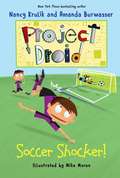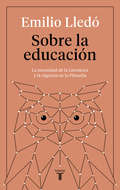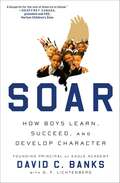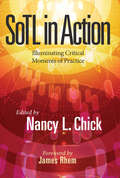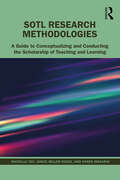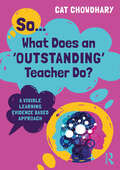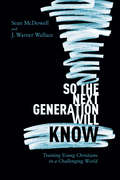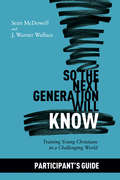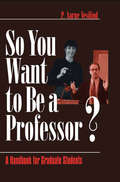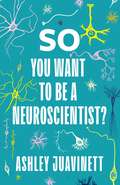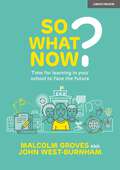- Table View
- List View
Soccer Shocker!: Project Droid #2 (Project Droid)
by Nancy Krulik Amanda Burwasser Mike MoranWhen Mom tells Logan that Java is joining his soccer team, the Purple Wombats, he’s not thrilled. It’s a lot of work teaching his new robot cousin how to act like a human-and keeping him out of trouble-and Logan needs a break.Still, being programmed for success means that Java’s also great at scoring. He might just turn the Wombats into a championship team, beating Sherry and Jerry Silverspoon and their Red Polar Bears . . . if he’d just let the other kids play, too. After being replaced as the Wombats’ MVP, Logan’s had enough.But when Java gets wet and goes on the fritz, can the whole team-even a short-circuiting Java-come together to score the winning goal?The second in a fantastically funny new chapter book series by internationally bestselling author Nancy Krulik and her daughter, Amanda Burwasser, Soccer Shocker is destined to win tons of fans.Sky Pony Press, with our Good Books, Racehorse and Arcade imprints, is proud to publish a broad range of books for young readers-picture books for small children, chapter books, books for middle grade readers, and novels for young adults. Our list includes bestsellers for children who love to play Minecraft; stories told with LEGO bricks; books that teach lessons about tolerance, patience, and the environment, and much more. While not every title we publish becomes a New York Times bestseller or a national bestseller, we are committed to books on subjects that are sometimes overlooked and to authors whose work might not otherwise find a home.
Soccer Dreams (Kids' Sports Stories)
by Shawn PryorWanting to be a striker like her grandpa was, Keisha jumps into soccer practice with both feet and, unfortunately, both hands. She's afraid her habit of catching the ball will end her sports dream, but Coach has a new game plan.
Soccer Chick Rules
by Dawn FitzgeraldWhile trying to focus on a winning soccer season, thirteen-year-old Tess becomes involved in local politics when she learns that all sports programs at her school will be stopped unless a tax levy is passed.
Soccer 'Cats: The Captain Contest
by Matt Christopher Jimmy Holder Matt HoobanIt's time to sign up for soccer league! Best buddies Dewey London and Bundy Neel are psyched about the new team, until they learn about the contest to be captain: Whomever draws the best team logo will be named captain. Should artistic Dewey enter even though he knows in his heart that Bundy would make a better captain?Passport to Reading Level 3
Sobrevivência no Mundo Real: Se Preparar e Sobreviver a Desastres
by Richard G Lowe Jr W. Marcello Soares ReisE se você pudesse melhorar drasticamente suas chances de sobrevivência depois de um grande desastre? E se você pudesse melhorar drasticamente suas chances de sobrevivência depois de um grande desastre? Imagine garantir que seus filhos e outros membros da família ficarão seguros mesmo depois do “grande terremoto” ou do furacão? Imagine como você se sentirá sendo o único no bairro com comida e água suficientes? O Especialista em Recuperação de Desastres, Richard Lowe, do CERT, (Civilian Emergency Response Team), explica como tornarem você, sua família e seus amigos preparados para qualquer desastre, grande ou pequeno. Com base em treinamento especializado, entrevistas com especialistas e experiência pessoal, Lowe responde à grande questão: qual é o segredo para melhorar as chances de sobrevivência, mesmo depois de um grande desastre?
Sobre la educación: La necesidad de la literatura y la vigencia de la filosofía
by Emilio LledóLa defensa a ultranza de una educación moderna y emancipadora, de enfoque humanista y con un papel clave reservado a la Filosofía. <P><P>Emilio Lledó, uno de los más relevantes pensadores españoles de nuestro tiempo, ha situado la educación en el centro de su filosofía, y el ideal pedagógico que defiende se alimenta, por supuesto, de unos sólidos cimientos filosóficos con especial atención en la filosofía griega clásica, al lenguaje y a la memoria, pero también de una larga experiencia en las aulas. <P>Lledó, a favor de una educación pública «que haga desaparecer las azarosas e injustas diferencias que necesariamente impone la sociedad», defiende también una organización moderna e interdisciplinaria -no asignaturesca- de los conocimientos, reflexiona sobre la identidad, la necesidad de cultivar el lenguaje, los peligros de la obsesión tecnológica, de la escuela y la universidad, y de la paulatina desaparición de las Humanidades. <P>«En la raíz de la palabra "educación" está un verbo latino que significa "guiar", "conducir"; pero también sacar algo de alguien: guiar, pues, y desarrollar lo que yace en el fondo originario de cada naturaleza que es dinamismo, posibilidad, evolución, progreso.»Emilio Lledó
Sobre Fogo E Gasolina
by Nicole CampbellExiste um momento na vida de uma garota onde ela precisa encarar uma preocupante pergunta: o que eu fiz? Aos dezesseis anos de idade, Vanessa Roberts está aprendendo rapidamente como lidar com o irritante – mas bonito – parceiro de laboratório, sua incrível melhor amiga com DDA, e a barreira cada vez maior entre ela e sua mãe. Zack Roads deveria ser tudo que ela merece. Ele é mais do que apenas uma distração agradável; ele é, também, o motivo de todos os olhares invejosos lançados na direção de Vanessa enquanto ela começa seu segundo ano na Gem City High. Mas o que acontece quando ela se vê em meio a um furacão de esperança, arrependimento e o perigo de se perder no meio do caminho?
Soar: How Boys Learn, Succeed, and Develop Character
by David Banks G. F. LichtenbergA respected educator, who has advised Hillary Clinton and Cory Booker on scholastic issues, presents a plan for teaching the country's most educationally endangered group--boys.David Banks knows a few things about at-risk boys. In 2004, he petitioned New York City's mayor to allow an all-boys public school to open in one of the most troubled districts in the country, the South Bronx. He had a point to prove: When rituals that boys are innately drawn to are combined with college prep-level instruction and community mentorship, even the most challenging students can succeed. The result? The Eagle Academy for Young Men--the first all-boys public high school in New York City in more than thirty years--has flourished and has been successfully replicated in other boroughs and other states. In Soar, Banks shares the experiences of individual kids from the Eagle Academy as well as his own personal story to help others get similar results. He shares the specific approach he and his team use to drive students, from tapping into their natural competitiveness and peer-sensitivity, to providing rituals that mimic their instinctual need for hierarchy and fraternal camaraderie, to finding teachers who know firsthand the obstacles these students face. Result-oriented and clear-eyed about the challenges and the promises of educating boys at risk, Soar is a book that no one who wants to see our young men flourish--from parents and educators to teachers and employers--can afford to miss.
SoTL in Action: Illuminating Critical Moments of Practice
by Nancy L. ChickWhat are the foundational moments of meaningful scholarship of teaching and learning (SoTL) projects? How do teacher-scholars collect, develop, and share useful insights about student learning? How do they work through the pinch points that frustrate, confuse, or elude many SoTL practitioners? By unpacking SoTL processes through rich narratives that illustrate what they look like, this collection offers inspiration to anyone at any stage of engagement with SoTL.This book takes discussions of SoTL to a new level. Its subtitle reflects the microscopic lenses SoTL processes can apply to student learning experiences to understand how they happen, what they look like, what they mean, and what we can do about them. Going beyond definitions, how-to, theory, and debates about methods and standards, the contributors offer a SoTL primer documenting how practitioners have intentionally thought through key moments in their work. These procedural vignettes present powerful examples of what doing SoTL looks like when done well.The authors represent a range of disciplines (the humanities, social sciences, natural sciences, and professions) and a mixture of familiar and unfamiliar names. Nancy Chick has selected contributions that compellingly illuminate why their authors focused on a particular critical moment, the questions they asked as they refined their approaches, and the theoretical and observational tools they employed to conduct their research. Each introduces a specific critical moment in doing SoTL, taking the reader through the author’s reflections, concerns, and choices in doing meaningful SoTL work.The aim is to support potential practitioners, inform educational developers who teach new SoTL practitioners, and inspire experienced SoTL scholars to reflect on their own practice. This is a compelling collection for anyone interested in practitioner reflection, intentional design, and advancing the field of SoTL and the quality of teaching and learning.
SoTL Research Methodologies: A Guide to Conceptualizing and Conducting the Scholarship of Teaching and Learning
by Karen Manarin Janice Miller-Young Michelle YeoCombining real examples with a roadmap of how to construct studies, analyze results, and share work, this book serves as a primary research methodology text for the field of Scholarship of Teaching and Learning (SoTL). The volume seeks to explore key aspects of SoTL that are often missing in past frameworks: research-based ontologies, epistemologies, and ethical axiologies. Chapters map out the expansive continuum of SoTL by detailing its history and key work while incorporating Indigenous perspectives on pedagogy and research methodologies. The text also features methods of qualitative and quantitative data generation essential for SoTL such as conducting interviews and focus groups, procuring data through questionnaires and artifact observation, and sharing results for dissemination in traditional and public scholarship. A comprehensive guide for conducting SoTL research, this book illustrates a broad array of contexts and a spectrum of research methodologies to expand, enrich, and support both novice and experienced SoTL practitioners and researchers in answering the contexts and questions at the heart of teaching and learning.
So... What Does an Outstanding Teacher Do?: A Visible Learning Evidence Based Approach
by Cat ChowdharyWhat distinguishes an Outstanding Teacher? A question asked in numerous interviews - and one that's much easier to ask than to answer. Many teachers will admit they don’t actually know what ‘Outstanding’ looks like. It's not about creating jazz hands lessons for a one-off observation, through 'prepping, stressing and box-ticking'. It isn’t something that can be achieved in a single lesson. It is a craft that needs developing like any other skill. This guide expands on previous works by discussing long-term development, the benefits of embedding skills, learner attributes and the impact of COVID. Influenced by John Hattie's Visible Learning research, So…What does an Outstanding Teacher Do? provides practical guidance and opportunities for self-reflection for teachers who want to maximise their positive impact on students’ learning. Areas covered include: Feedback Student voice Self-regulation Teachers working collectively Differentiated learning objectives SOLO Taxonomy Questioning and observation Chowdhary provides teachers with recommendations for enhancing practice that easily apply to any classroom, regardless of their subject, speciality or position. Whether you are a PGCE Student, an ECT or a practising teacher, this book is a practical and accessible guide for any teacher who aspires to maximise their positive impact and become truly outstanding.
So, You Want to Be a Leader?: An Awesome Guide to Becoming a Head Honcho
by Patricia WoosterHave you ever been excited by the idea of leading a group or being in charge? This comprehensive guide reveals a whole host of careers you can pursue with leadership skills you can start building today.We have all known kids who say they want to grow up to be President of the United States, but what about becoming an educational leader or the CEO of a company? There are myriad ways kids today can grow up to become the leaders of tomorrow. But the only way to get there is to start becoming a leader today. Covering everything from well-known professions like CEO, school superintendent, and government officials, to the not-so-well-known professions like becoming an entertainment leader or spiritual advisor, So, You Want to Be a Leader? uncovers a treasure trove of opportunities for kids to assert themselves now to ensure a successful future. In addition to tips and interviews from professionals in the industry, So, You Want to Be a Leader? includes inspiring stories from kids who are already leaders in their own communities, activities, a glossary, and resources to help kids on their way to a successful and fulfilling career.
So, This Is Love
by Tracy AndreenIn the sequel to Tracy Andreen's debut romantic comedy So, This Is Christmas, we follow Finley and Arthur back to Barrington Academy for a swoony semester.Perfect for fans of Tell Me Three Things and Anna and the French Kiss!Finley and Arthur are back at boarding school and neither quite knows where the other stands—are they couple? Are they not a couple? What does one magical Christmas Eve kiss in Oklahoma mean for their relationship status? This confusion isn't helped by the re-entry of old enemies into their school lives, especially ones that may or may not be crushing on Arthur. Finley is at a loss when navigating the complexities of her new (maybe) relationship, which could very well turn into love. . . if she doesn't blow it.So, This Is Love is a perfect read for the Valentine's Day season, or for anyone looking for a delightful romantic comedy that has just a dash of drama. Once again, Tracy Andreen has proven that no one writes a holiday rom-com like her.
So, This Is Christmas
by Tracy AndreenLet It Snow meets Dash and Lily's Book of Dares in this new small-town Christmas romance.When Finley Brown returned to her hometown of Christmas, Oklahoma, from boarding school, she expected to find it just as she left it. Christmas hasn't changed much in her sixteen years. But instead she returns to find that her best friend is dating her ex-boyfriend, her parents have separated, and her archnemesis got a job working at her grandmother's inn. And she certainly didn't expect to find the boy she may or may not have tricked into believing that Christmas was an idyllic holiday paradise on her grandmother's doorstep. It's up to Finley to make sure he gets the Christmas he was promised. This is Finley's Christmas. It's about home and family and friends and finding her place, and along the way she also finds the best Christmas present of all: love.
So werden wir lernen!
by John Erpenbeck Werner SauterWie werden wir in zehn Jahren beruflich - betrieblich lernen? In welcher Weise werden wir dann die vielfältigen neuen Möglichkeiten der Lerntechnologie und des sozialen Lernens im Web nutzen, die sich schon heute andeuten? In den kommenden zehn Jahren werden Computer zu aktiven Lernpartnern, die Kompetenzentwicklungsprozesse ermöglichen und tutoriell begleiten. Dabei sind drei Trends von wesentlicher Bedeutung: * Die Entfaltung semantischer Netze im Rahmen von Kompetenzentwicklungsprozessen, * die zunehmende Einbeziehung des Cloud Computing in betriebliche Lernsysteme, * die Nutzung immer leistungsfähigerer "humanoider" Computer als Tandempartner beim selbstorganisierten Kompetenzaufbau. Die Autoren analysieren diese Entwicklungen. Sie leiten Trends für das Lernen in der Zukunft ab und entwickeln Anwendungsvorschläge für die Kompetenzentwicklung mit dem "Lernpartner Computer". Sie prognostizieren, wie sich Lernräume und Lernkulturen in Unternehmen schrittweise auf diese kommenden Veränderungen hin entwickeln werden und leiten daraus konkrete Handlungsempfehlungen für die Gestaltung der aktuellen Lernsysteme ab.
So viel Mathe muss sein!: Gut vorbereitet in ein WiMINT-Studium
by Klaus Dürrschnabel Rolf Dürr Wolfgang Erben Matthias Gercken Karin Lunde Rita Wurth Marc Zimmermann Torsten SchatzMithilfe dieses Arbeitsbuches können sich Studieninteressierte auf die mathematischen Herausforderungen in einem WiMINT-Studium vorbereiten. Kurze, verständlich formulierte Texte frischen Schulwissen wie logisches Begründen, Bruchrechnen, Differentialrechnung oder lineare Gleichungssysteme wieder auf. Hierbei helfen eine Vielzahl an Beispielen und Aufgaben mit Lösungen sowie Selbsttests am Anfang jedes Kapitels, mögliche Stolperfallen schon frühzeitig zu identifizieren. Thematisch orientiert sich das Arbeitsbuch am sogenannten cosh-Mindestanforderungskatalog, welcher von Lehrenden aus Schule und Hochschule gemeinsam entwickelt wurde. Dieser hält nach übereinstimmender Meinung vieler deutscher Hochschulen, Dachverbände und Hochschullehrenden das für ein WiMINT-Studium notwendige mathematische Vorwissen fest. Neben allgemeinen mathematischen Kompetenzen werden elementare Algebra, Geometrie, Analysis, lineare Algebra und analytische Geometrie sowie Stochastik abgedeckt.
So the Next Generation Will Know: Preparing Young Christians for a Challenging World
by J. Warner Wallace Sean McDowellAs Gen Z leaves the church in record numbers, the adults in their lives feel at a loss to stop the trend. Yet there are research-based and proven strategies that help young people both own their faith and effectively engage the world around them. Sean McDowell, Ph.D., and Detective J. Warner Wallace have written and taught extensively on the subjects of culture, worldview, and apologetics. In So the Next Generation Will Know, McDowell and Wallace provide strategies and practical tactics from their own personal experiences to help parents, youth leaders, and Christian teachers train the next generation with the truth of the Christian worldview. Each chapter of So the Next Generation Will Know features information that speaks directly to the various adults in a student’s life; interviews with pastors, apologists, teachers, and cultural experts; and examples of people and ministries who are effectively teaching truth to the next generation. With the right training, the young people you work with don’t have to be another statistic.
So the Next Generation Will Know Participant's Guide: Preparing Young Christians for a Challenging World
by J. Warner Wallace Sean McDowellThis fully-researched, eight-session guide takes participants through a variety of engaging materials that will enable youth leaders, Christian teachers, and parents to strategically teach truth to the next generation. These authors are both parent’s and have been youth leaders (and Sean has been a Christian school teacher), so they know how to equip youth influencers to discover fresh ways to reach students and help them be effective defenders of God’s truth. Written to work seamlessly with their all-new book and video series, this accessible guide includes questions for reflection, notes for discussion, and plenty of real-life ministry examples to aid readers as they seek to apply the most effective tools to their own youth ministries and classrooms. Participants will grow confident that they’re utilizing the best practices available as they send their youth out into a challenging culture.
So You're Thinking About Homeschooling: Fifteen Families Show How You Can Do It!
by Lisa WhelchelDiscover the Diversity of Homeschooling Confused and intimidated by the complexities of homeschooling, many parents assume it could never work for them. Now an updated edition ofSo You're Thinking About Home Schoolingby Lisa Whelchel-herself a homeschooling mother of three-introduces to readers fifteen composite portraits of homeschooling families who show how every family can successfully face the unique challenges of its situation. The story-based approach deals with common questions of time management, teaching weaknesses, and outside responsibilities, as well as children's age variations, social and sports involvement, learning disabilities, and boredom. Seeing a wide variety of homeschooling families in action gives parents the information and confidence they need to make their own decisions about home-based education. Includes a new chapter from Lisa and an all-new resource guide with recommendations from real-life homeschooling families! [Banner across upper left corner of back cover]: New, Updated Edition! "I'm Thinking About Homeschooling" You're also probably thinking,But can I really teach my children? Where do I start? What if I need to work outside the home? Must I have twelve children, raise goats, and bake my own bread? And what about socialization? I could tell you the answers to these questions, but I would rather show you. Beginning with my own, I want to introduce you to fifteen families in fifteen unique situations who have all chosen to homeschool for different reasons, using a variety of learning methods. Sohellip; let's rap lightly on the homeschool door and peek inside before we decide if we are ready to move in! -Lisa "Deciding if homeschooling is right for your family just got easier with this warm, entertaining, information-packed portrayal of its flexibility, diversity, triumphs, and challenges. Grab a cup of tea and enjoy!" -Linda Dobson, author ofThe First Year of Homeschooling Your Child Story Behind the Book "My hope is that by the end of the book, and a stroll through the neighborhood, you will feel more confident as you identify a family situation and teaching method that resonates with your personality and philosophy of education. From there, you can simply look to the end of each chapter to find a sample schedule for the homsechool day and list of curriculum suggestions for that particular teaching method. " From the Trade Paperback edition.
So You Want to Write a Novel: A Direct, Practical, Step-by-Step Guide for the Aspiring Author
by Lou Willett StanekYou know there is a novel locked inside of you—chock-full of conflict, humor, irony, enthralling events and fascinating characters. What you don't know is how to set it free.Practical Advice, Hands-On HelpRespected author and professional writing instructor Lou Willett Stanek's New York workshops have enabled scores of aspiring novelists to realize their dreams of completing credible and compelling manuscripts. Here, in a positive, "user-friendly" format, she offers not only encouragement and motivation, but Clear, Step-By-Step Instructions To Accomplish Your Goal—from original conception through final draft.Learn How To: Set up and stick to a writing schedule Create unforgettable characters Follow strong plotting and solid structure guidelines Choose a viewpoint and develop conflict Handle flashbacks and transitionsNot Just Philosophy Or A Simple Motivational Tool, This Is The Book That Tells You How To Succeed
So You Want to Be a Professor?: A Handbook for Graduate Students
by P VesilindMaybe you'd like to combine the two loves of your life, teaching and scholarship, and perhaps build a satisfying and profitable academic career, but you're not sure if this is really what you want or how to go about it. Or maybe you've made up your mind but need some good advice on how to succeed. If so, this book is written for you. So You Want To Be a Professor begins with a discussion of jobs in academia and how to find them. Chapters cover a wide range of political skills for future academic success, including lecturing, organizing a course, meeting your first class, testing, maintaining a research program, and writing for publication. No other book provides such a practical overview of essential career-building skills. Even junior faculty will benefit from the advice in this engaging, comprehensive book.
So You Want to Be a Neuroscientist?
by Ashley JuavinettThe pursuit to understand the human brain in all its intricacy is a fascinatingly complex challenge and neuroscience is one of the fastest-growing scientific fields worldwide. There is a wide range of career options open to those who wish to pursue a career in neuroscience, yet there are few resources that provide students with inside advice on how to go about it.So You Want to Be a Neuroscientist? is a contemporary and engaging guide for aspiring neuroscientists of diverse backgrounds and interests. Fresh with the experience of having recently launched her own career, Ashley Juavinett provides a candid look at the field, offering practical guidance that explores everything from programming to personal stories.Juavinett begins with a look at the field and its history, exploring our evolving understanding of how the brain works. She then tackles the nitty-gritty: how to apply to a PhD program, the daily life of a graduate student, the art of finding mentors and collaborators, and what to expect when working in a lab. Finally, she introduces readers to diverse young scientists whose career paths illustrate what you can do with a neuroscience degree. For anyone intrigued by the brain or seeking advice on how to further their ambitions of studying it, So You Want to Be a Neuroscientist? is a practical and timely overview of how to learn and thrive in this exciting field.
So You Wanna Be a Superstar?: The Ultimate Audition Guide
by Ted MichaelGeared toward hopeful musical theater, show choir, a cappella, and glee club singers, as well as all shower singers that want to improve their skills, this enthusiastic and practical guide can help anyone's inner superstardom make a public appearance. <P><P>Full of straightforward, well-organized advice for every step of the process, this book will help you train your vocal cords, pick the right audition material, and become comfortable with the spotlight. Interactive quizzes, helpful sidebars, and words of advice from industry professionals add a personalized and real-world touch. Author Ted Michael, a veteran of music and theater, along with the help of popular actors, actresses, and singers, provides all the tools young singers need in order to nail their auditions and nurture their natural show-stopping abilities.
So What?: The Writer's Argument
by Laura Miller Kurt SchickThis book teaches students how to write compelling arguments and explains why practicing argumentation is essential to learning and communicating with others. Practical exercises throughout each chapter reinforce this broader academic aim by focusing on the key issue of significance-helping writers answer the "So What?" question for themselves and their audiences. By showing students how their writing fits within the broader context of academic inquiry, the book encourages them to emulate and adapt authentic academic styles, foundational organizing structures, and helpful rhetorical moves to their college classes and beyond.
So What Now? Time for learning in your school to face the future
by Malcolm Groves John West Burnham“It is not the role of schools to solve the climate crisis or any of the other multiple crises now facing humankind. But it is powerfully their role, if they so choose, to equip young people as well as possible to deal with the consequences of the serious problems they will be inheriting from their elders, not betters.” Could it be our collective failure to respond effectively to the threat of the climate emergency or the challenges of the pandemic has been shaped to a small but significant degree by the nature of the learning that happens in our schools and a failure to enable young people to learn appropriately there? That question lies at the heart of this thought-provoking new book as it unpicks the concept of deep learning for future sustainability. This combines deep understanding with action, and links both to moral purpose. It is not enough just to be concerned about climate change - awareness must lead to action. The book draws on an eclectic range of sources, case studies of actual practice, critical perspectives and opportunities for reflection. The authors argue that first and foremost it is for educators and leaders to get on as best they can in their own school context to do what is both necessary and right to secure learning fit for a just and sustainable future irrespective of governmental lead in these matters. In doing so the authors set out some clear evidence-informed principles for school development and leadership that are central to the success of that mission.
